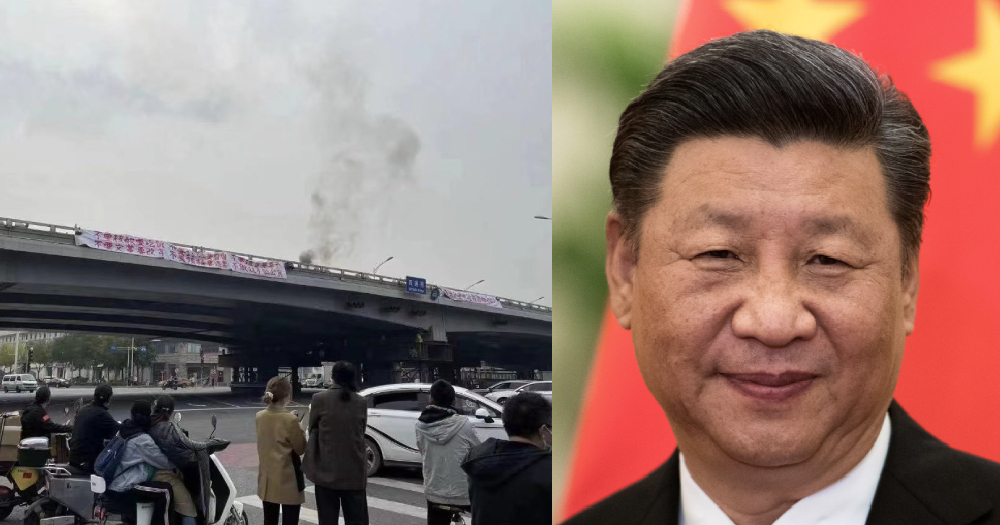Follow us on Telegram for the latest updates: https://t.me/mothershipsg
Officials in Beijing took the unprecedented step of temporally banning "Beijing" as a search term following a rare protest in China's capital.
You won't like angry banner
According to Bloomberg, on Oct. 13, two banners were hung from the Sitong bridge, located in northwest Beijing. Shortly after, a plume of smoke could be seen from the bridge, although it is not clear what caused it.
The two banners had messages that protested against the harsh zero-Covid policies enacted in China since the start of the pandemic, as well as China's President Xi Jinping.
One banner contained a message written in mandarin in six stanzas, as translated by The Washington Post:
"We want to eat, not do coronavirus tests
We want reform, not the Cultural Revolution
We want freedom, not lockdowns
We want elections, not rulers
We want dignity, not lies
Be citizens, not enslaved people"
今天北京海淀中电信息大厦附近的桥惊现“反动标语”:“不要核酸要吃饭,不要封控要自由,不要谎言要尊严,不要文革要改革,不要领袖要选票,不做奴才做公民”。值此喜迎二十大之际,要被作为要案大案追查的。 pic.twitter.com/t2jnJaJkTD
— 方舟子 (@fangshimin) October 13, 2022
The other banner called for a general strike:
"Students strike, workers strike, people strike;
The dictator, traitor -- Xi Jinping"
A banner against Xi Jinping is raised at Sitong Bridge, Haidian District, Beijing.
— The Great Translation Movement 大翻译运动官方推号 (@TGTM_Official) October 13, 2022
Admire the courage of this man, but when the giant ship sank, the screams of the passengers were only the meaning of tragedy.#TheGreatTranslationMovement pic.twitter.com/tMt4spulZR
One Chinese social media user driving past the bridge recorded a man broadcasting the banner's message:
Sitong Bridge, Haidian District, Beijing, a man displayed banners and shouted slogans against Xi Jinping. He had been arrested and voice disappeared, but maybe in the future, everyone who crosses this bridge will remember that there was once a man...#TheGreatTranslationMovement pic.twitter.com/Fr20sF9XFK
— The Great Translation Movement 大翻译运动官方推号 (@TGTM_Official) October 13, 2022
The man responsible for the protest is said to be a Chinese scientist named Peng Lifa, although this has not yet been verified.
Hero of Sitong Bridge is a scientist named Peng Lifa.
— Phil Cunningham (@jinpeili) October 14, 2022
He opposes superstitious imperial personality cult and coercive Covid prevention theater. pic.twitter.com/Yq7kkc5rnb
A rare protest against Chinese leader Xi Jinping and his policies was swiftly ended in Beijing Thursday. It's likely the man who staged the protest is #PengLifa, social media name Peng ZaiZhou. Hopefully it can be verified soon. #彭载舟 本名 #彭立发pic.twitter.com/shKLZ6P0qu
— Partisan Review (@PartisanReview) October 13, 2022
A bridge too far
Chinese authorities had reacted strongly to images of both the banner and the message it tried to spread. In addition to arresting the man and removing the banner, they tried to censor discussion of the incident on social media.
The Guardian reported that searches related to the protest were banned, including the remarkable step of banning searches for the capital "Beijing", as well as words like "bridge".
In addition, bridge guards have apparently been set up in the Beijing area, preventing similar protest from occurring.
北京中共当局 现在是惊弓之鸟!
— Xiang Li (@xiangli001) October 14, 2022
北京街头现在是五步一岗十步一哨。
一万个自信,哪去了?!#赤纳粹#恐怖主义统治 pic.twitter.com/Zaw5lzHl8N
When AP visited the Haidian area the next day, people who worked in the vicinity of the bridge denied seeing anything occurr at the bridge, with many refusing to speak to them.
However, outside of China, it seems that many dissidents and protestors have taken up the words of the bridge protest, such as university students.
Interestingly, some Chinese language signs in support of the Beijing Sitong Bridge banner protest are appearing globally, especially at universities. This is is in Paris's main Chinatowns. https://t.co/vwJB6FatCp
— Fanny Potkin (@f_potkin) October 15, 2022
Chinese international students have started mobilizing to reprint different versions of the Beijing Sitong bridge protestor’s demands in different university campuses. Students from over 30+ campuses have joined.
— promise li (@promiseli0) October 14, 2022
Follow @citizensdailycn on IG or @VoiceofCN on TG for updates. https://t.co/RKyOHHZMID pic.twitter.com/RHDD7S4e0o
Even in China itself, there are signs that dissatisfaction with the government is rising, with an in-depth report by the Wall Street Journal noting that many posts about Communist Party leaders in China have almost all comments hidden, and many official posts preemptively preventing comments.
China is holding the 20th Communist Party Congress, where President and Party Secretary General Xi Jinping is to be coronated party leader for an unprecedented third term. This comes amidst growing frustration over Covid-19 prevention measures, such as harsh lockdowns with little warning, and other associated challenges presented to the economy.
The congress is likely the reason why authorities have responded to news of the protest with harsher than usual measures. Some Chinese claimed their Weibo accounts have been permanently banned after sharing images of the bridge protest -- a temporary ban lasting weeks or months would have been more common.
16/ I spoke to WeChat users who were banned forever from their account as they had shared this picture. In the past, Wechat would suspend you for a day or a week over politically sensitive topics, but not this time. With this incident, it was a complete ban for all who shared. pic.twitter.com/cEeCZEXkNX
— Liza Lin (@lizalinwsj) October 15, 2022
Related stories
Top image via @fangshimin /Twitter & Nicolas Asfouri-Pool/Getty Images
If you like what you read, follow us on Facebook, Instagram, Twitter and Telegram to get the latest updates.
